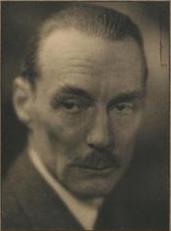Maurice Dufrêne
| Maurice Dufrêne | |
|---|---|

Dufrêne by Laure Albin Guillot in 1925
|
|
| Born | 1876 Paris, France |
| Died | 1955 Nogent-sur-Marne, France |
| Nationality | French |
| Occupation | Decorative artist |
| Known for | Maîtrise workshop |
Maurice Dufrêne (1876–1955) was a French decorative artist who headed the Maîtrise workshop of the Galeries Lafayette department store.
Maurice Dufrêne was born in Paris in 1876. His father had a wholesale commodities business. Dufrêne would collect left-over pieces of wood, cardboard and fabric from his father's workplace and turn them into decorative artworks. He studied at the École des Arts Decoratifs. Originally he planned to be a painter.
Dufrêne found a position as a manager and furniture designer at La Maison Moderne of Julius Meier-Grafe, whose showrooms displayed rooms decorated in Art Nouveau style. There he worked with designers such as Henry van de Velde, Victor Horta, Charles Plumet and Anthony Selmersheim. From 1903 Dufrêne exhibited regularly at the Salon d'Automne and the Salons of Société Nationale des Beaux-Arts. In 1904 he was one of the founding members of the Société des artistes décorateurs, and for thirty years he would exhibit at its Salon. He designed many different types of decorative art including metalwork, ceramics, glass and fabric. He also designed complete interiors, but was best known for his furniture.
Dufrêne taught at the École Boulle of Paris from 1912 to 1923. He also taught at the École des Arts Appliqués. He was one of the main designers of the modernistic set for the 1919 film Le Carnaval des vérités. In 1921 the Galeries Lafayette launched the Maîtrise workshop under Dufrêne's direction. This workshop followed the Primavera of the Printemps store founded in 1912 by René Guilleré and also competed with Paul Follot's Pomone of Le Bon Marché, and the Studium of the Grands Magasins du Louvre.
...
Wikipedia
